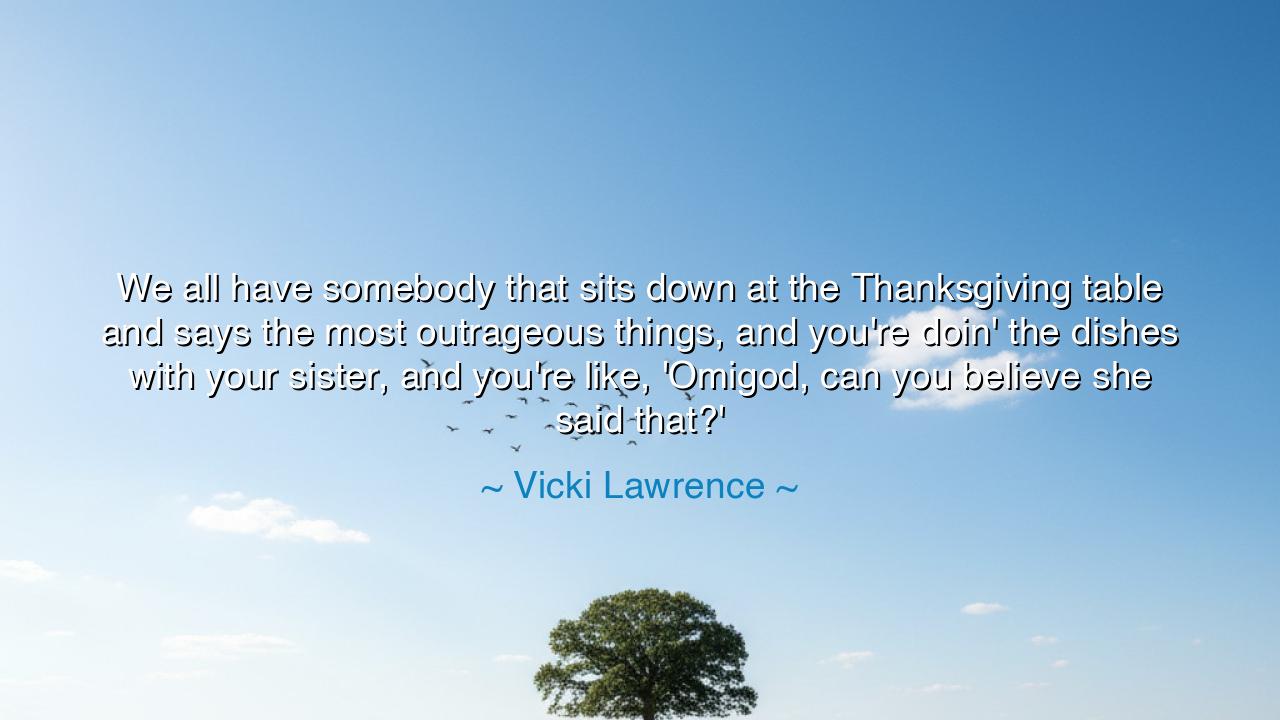
We all have somebody that sits down at the Thanksgiving table
We all have somebody that sits down at the Thanksgiving table and says the most outrageous things, and you're doin' the dishes with your sister, and you're like, 'Omigod, can you believe she said that?'






Vicki Lawrence, with humor that veils deep truth, once said: “We all have somebody that sits down at the Thanksgiving table and says the most outrageous things, and you're doin' the dishes with your sister, and you're like, 'Omigod, can you believe she said that?'” Her words, though playful, reveal the timeless tension of family gatherings, where love and discord sit side by side, where joy and irritation mingle like flavors on the same plate. What she names is not only the laughter of comedy, but the essence of kinship—that in every clan, there are voices that unsettle, yet they are still part of the circle.
The origin of this reflection lies in the very nature of family. Unlike friendships, which we choose, family is given to us. Around the Thanksgiving table, generations gather—elders with their stories, children with their impatience, siblings with their rivalries. And in such gatherings, it is inevitable that someone will speak words that shock, offend, or amuse. Lawrence captures the universal experience of leaving the table to whisper in the kitchen with a sibling, marveling at the outrageousness of another relative. Yet this very drama is part of the living texture of family, part of what makes the gathering real.
History itself offers echoes of such scenes. Consider the records of early pilgrim feasts, where settlers and Native Americans sat together. Different tongues, different customs, and different worldviews must have produced words that seemed outrageous to one another. Or look to the households of kings and emperors, where family banquets often turned into stages for debate, insult, or rivalry. Even the ancient Greeks told stories of divine feasts on Olympus where gods quarreled openly. The Thanksgiving table, then, is but a modern stage for an age-old play: human beings, bound by blood, revealing themselves in unguarded words.
The deeper meaning is this: the outrageous things said at the table are often a mirror of truth, though awkwardly delivered. Sometimes, they expose hidden wounds in the family. Sometimes, they simply reflect the eccentricities of age, or the refusal of an elder to follow the new ways. And sometimes, they remind us that love does not mean uniformity. To sit at the table is to accept not only the comfort of kinship but also the discomfort. Families are forged not in perfection, but in the endurance of one another’s flaws.
There is also a lesson in Lawrence’s imagery of the dishes with your sister. After the storm of words at the table, the quieter work in the kitchen becomes the sanctuary where siblings share confidences and laughter. Here lies a paradox: even the outrageous relative strengthens bonds, for they give siblings a story to share, a moment of unity against absurdity. Thus, even conflict or awkwardness can become the seed of closeness.
The lesson for future generations is clear: do not let the outrageous words of family gatherings destroy the feast. See them instead as reminders of the imperfection of human love. Approach them with patience, humor, and forgiveness. Whisper about them in the kitchen if you must, but return to the table with grace. For one day, even those outrageous voices will fall silent, and what will remain is not the irritation of their words, but the memory of their presence.
Practical wisdom follows: prepare your heart for family gatherings as much as you prepare your table. Expect both joy and friction. Teach your children that family is not about perfect harmony, but about enduring together through laughter and discomfort alike. When you hear words that shock, do not let anger rule you; instead, respond with gentleness or silence. And later, in the quiet spaces, let laughter heal the sting.
Thus, Vicki Lawrence’s humorous reflection becomes a timeless teaching. The Thanksgiving table is a mirror of life itself: filled with abundance, filled with voices both tender and outrageous, and bound together by something greater than words—by the unbreakable tie of love. Cherish even the uncomfortable moments, for they too are part of the feast of memory that endures across generations.






AAdministratorAdministrator
Welcome, honored guests. Please leave a comment, we will respond soon